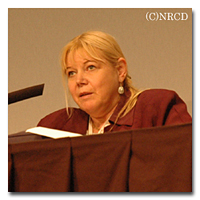The UN Convention on the rights of persons with disabilities, Copyrights and disability
Kicki Nordstrom, World Blind Union
WBU
http://www.v2020.org/members/wbu.asp

Thanks for giving me the opportunity to speak on a subject of greatest importance for blind and visually impaired people, namely copyrights issues,
Firstly I would like to express the World Blind Union's satisfaction for the inclusion of copyrights exceptions to be included in the drafting of the Convention of Human Rights of Persons with Disability, which is now under process in New York and which we helped to elaborate.
The main aim of my intervention is to provide a short explanation which deals with copyright exceptions for people with reading-related disabilities.
I do so with the intention of helping States Parties and NGOs in the WSIS process to appreciate the significance and relevance of this somewhat specific part of ICT.
A reading- related disability is a disability which prevents a person from accessing a printed work by conventional means. The types of disabilities covered by this term include, but are not limited to, blind people, deafblind people, people with learning disabilities, autistic persons, persons with intellectual disabilities, persons with dyslexia those who cannot physically hold a book or others.
For people with reading related disabilities to access published information such as novels and reports, they must convert the document into audio, braille, easy-to-read or other accessible formats.
People with disabilities are happy to pay the normal price for such documents, and we are not arguing for special favours.
However, current copyright law in many states prohibits the copying of works into any format, or makes no provision for the copying of a document into alternative formats. Such laws discriminate against people with a reading-related disability, given their need to convert the document into a different format in order to read it.
This exclude for instance children with reading related disabilities to get the same school books as their class mates but in an alternative format, and even to get a school book at all.
This contradict to the UN education For All (EFA) program which states that ALL children in the world should have access to general and compulsory education before 2015. It also contradict to the 8 UN Millenium Goals (MDG),which should be achieved before 2020.
In article 19 in the Universal Declaration on Human Rights from 1948, it states:
"Everyone has the right to freedom of opinion and expression; this right includes freedom to hold opinions without interference and to seek, receive and impart information and ideas through any media and regardless of frontiers."
How can anyone think this fundamental Human Rights could be achieved if some groups of people are denied information due to copyright protections?
In the drafting text of the convention on the rights of persons with disabilities, the international disability caucus (IDC), requires that States Parties make an exception for people with reading-related disabilities under their national copyright law.
Such an exception would allow people with a reading-related disability to purchase published material and render it accessible without breaking the law.
It would further allow the transfer of such material- in an accessible format- to another state for use by a person with a reading-related disability. This is important, since many countries have little in the way of facilities to make books or documents accessible and would benefit from receiving material in accessible formats, and avoid duplication of effort.
Lastly, the IDC text requires that electronically published material which carries a "technical protection measure" to prevent copyright abuse, would have to be created in a way which is accessible to people with reading-related disabilities.
For an example of a technical protection measure, PDF files, which are often protected by such measures, often contain blocks on text-to-speech technology.
The IDC proposed text to the convention requires that such files be prepared in such a way that they do not hinder access for people with reading-related disabilities.
Across the world, millions of people with reading related disabilities are currently unable to access published books and documents freely available to everyone else. The World Blind Union therefore urges States Parties to adopt the proposed text of the IDC relating to copyright to ensure that people with reading related disabilities can exercise their right to read for pleasure, information and education.
Thank you.
Kicki Nordstrom
